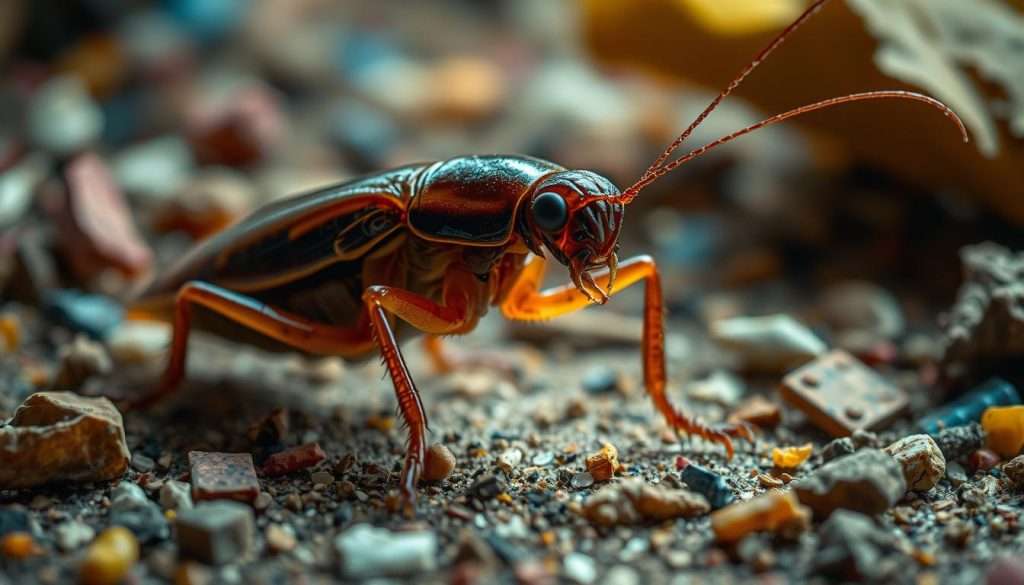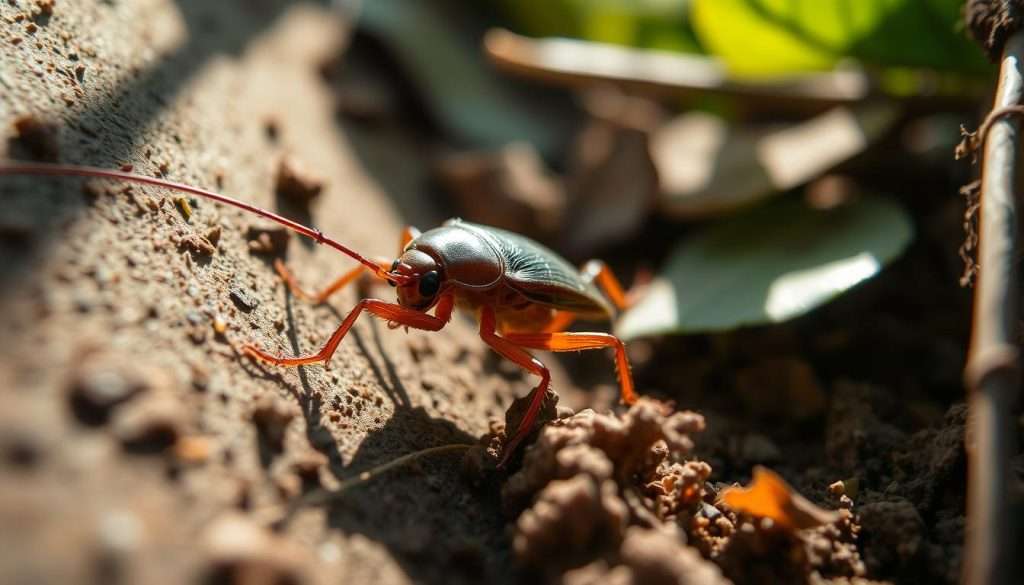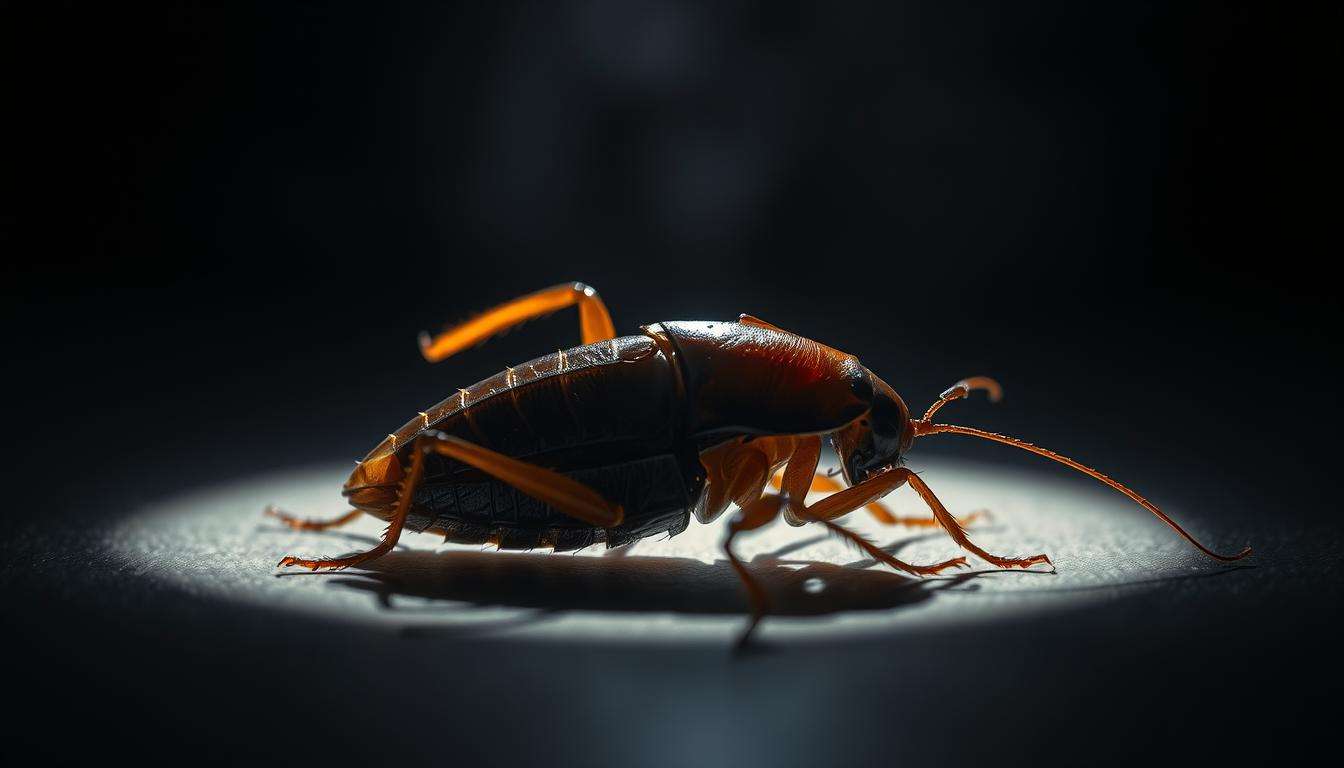Welcome to our look at one of nature’s most amazing survival stories: the cockroach. You might be curious, how long can a cockroach live without its head? These tough creatures are known for living through harsh conditions, even without a head for weeks. Their unique body systems are different from ours, allowing them to keep going after losing their head.
In this article, we’ll explore the amazing body of cockroaches. We’ll see what makes them so good at surviving and what it means for fighting pests.
Key Takeaways
- Cockroaches can live without their heads for several days to weeks.
- Their decentralized nervous system plays a crucial role in their survival.
- Factors such as dehydration and starvation eventually lead to death.
- Understanding cockroach resilience can aid in effective pest control.
- Comparative studies show other animals exhibit similar headless survival abilities.
Understanding Cockroach Anatomy
Cockroaches have amazing features that help them survive. Each special trait lets them live in many places. Knowing about their body helps us see how they can live for weeks without a head.
Open Circulatory System
Cockroaches have an open circulatory system. This system has lower pressure than ours. It lets them keep working even after they lose their head.
Their blood, or hemolymph, moves freely. It brings nutrients to their organs. This helps them survive longer without a head.
How Cockroaches Breathe
Cockroaches breathe through tiny openings called spiracles. They don’t need a head to breathe. Air goes in through spiracles and reaches their body tissues.
This way of breathing is key to their survival. It lets them breathe even after they lose their head.
Comparison with Human Anatomy
Cockroaches are very different from humans. Humans need a head for breathing and eating. But cockroaches can keep going without a head.
They have ganglia in each body segment. These ganglia help them function. This shows how different survival strategies can exist in different species.
How Long Can a Cockroach Live Without Its Head
Cockroaches can live without their heads for a long time. This raises many questions about their ability to survive. It shows how amazing their biology and adaptability are.
Survival Timeline After Decapitation
Cockroaches can live up to a week without their heads. Their cockroach resilience comes from their special body design. They can even survive without food for about a month.
But, they need water to live. Without it, they can’t last a week. This shows how incredible these decapitated insects are.
Factors Influencing Lifespan Without a Head
Many things affect how long cockroaches can live without their heads. Important factors include:
- Environmental Conditions: The right temperature and shelter help them live longer.
- Food Availability: Having food for a month helps them stay healthy.
- Predators and Threats: Without dangers, they can live longer in safe places.
Studies show how tough and adaptable cockroaches are. They can handle important survival needs. For more on cockroach survival, check this resource.

Cockroach Survival Tactics
Cockroaches have many ways to survive tough conditions. Knowing these tactics helps homeowners fight pests better.
Food and Water Requirements
Cockroaches can live without food for weeks. But they need water at least once a week. They do well in humid places. To stop them, homeowners should:
- Seal food containers well.
- Clean spills and crumbs fast.
- Lower moisture at home.
Adaptations to Harsh Environments
Cockroaches can handle very cold or hot temperatures. This lets them live in many places, like:
- Garbage areas
- Basements
- Poorly ventilated spaces
Ability to Hold Breath
Cockroaches can hold their breath for up to 40 minutes. This helps them survive in wet conditions. Their survival skills make them hard to get rid of.

The Science Behind Cockroach Resilience
Cockroach survival has caught the eye of scientists. They find it fascinating. Entomology facts show how these bugs can survive extreme conditions, even without heads.
Decapitated Insects and Reflex Actions
It’s amazing that cockroaches can act after losing their heads. They have ganglia that control basic functions. This lets them react to things, showing their survival skills.
This shows how complex their nervous system is. It challenges what we thought we knew about insects.
Research Findings on Cockroach Survival
Studies show cockroaches can move and react even without heads. If a head keeps getting food, it can stay alive. This is key in research on cockroach survival.
Their ability to survive and even thrive in bad conditions is interesting. It leads to talks about their biology and how they survive.
Conclusion
Cockroaches are amazing because they can live a long time, even without a head. Their special body setup lets them survive. They have a unique circulatory system and move in special ways.
This makes them very good at adapting. Learning about cockroaches is not just interesting. It also helps us find better ways to control pests.
To keep cockroaches away, make your home less inviting to them. Keep your kitchen clean and seal up holes. This makes it harder for them to get in.
By doing these things, you can make your home safer. You’ll also learn to appreciate how cockroaches can survive.
Even though cockroaches might scare you, knowing about them helps. You can then fight pest problems more effectively. This makes your home a healthier place to live.
